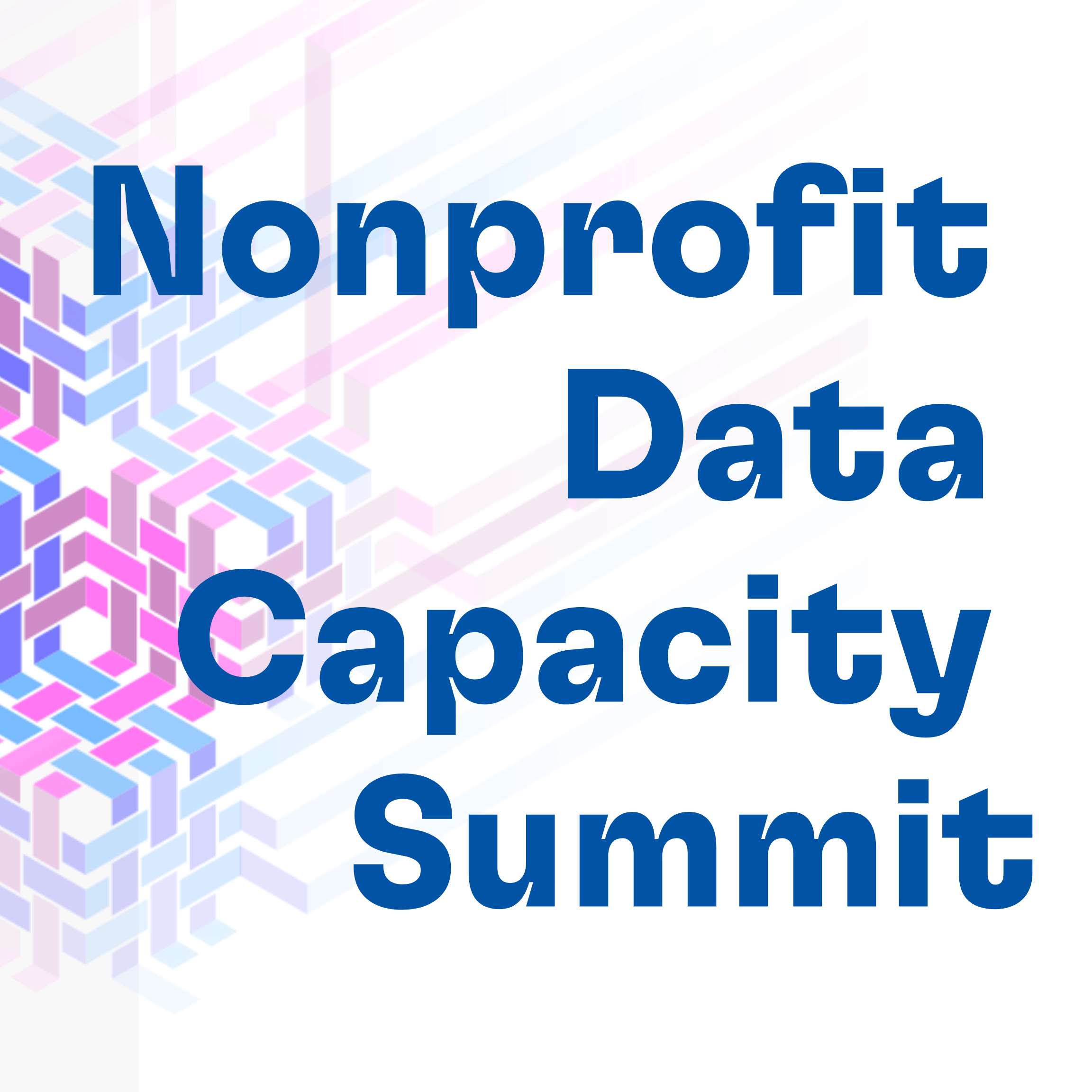
Media and Events
Panel: “Future Skills in Demand: AI and Digital, Social and Emotional, Green” at A Future Built on Skills: Securing Canada’s Prosperity
At A Future Built on Skills, Blueprint CEO Karen Myers joins Michael Burt (Conference Board of Canada), Dr. Wendy Cukier (Diversity Institute), and Mark Patterson (Magnet) in a panel moderated by the FSC’s Alex Stephens on the skills that will define Canada’s success in the next decade. Panelists will explore AI and digital skills, social and emotional skills, and green skills—what’s working, where the gaps are, and the bold steps needed to prepare Canadians for the jobs of tomorrow. A Future Built on Skills is a one-day hybrid event that brings together the country’s most influential voices in skills, training, and workforce development—from government and business to education and community.
The Nonprofit Data Capacity Summit
Blueprint is hosting the Nonprofit Data Capacity Summit! This event brings together nonprofit staff and leaders, intermediaries, funders, and government for a day of engaging and meaningful cross-sector conversations. The summit is designed to foster collaboration and offer strategies to help strengthen the sector’s capacity to create data-informed impact for the communities they serve. The day will feature presentations from leaders in the field and funding partners, along with breakout sessions focused on building data capacity, sharing tools and resources, and exploring what a more connected, equitable future state of nonprofit data could look like.
Breakout Panel: “Reframing Social Spending: Investing in Canada’s Future” at IPAC’s National Public Service Symposium
With rising fiscal pressures and growing service demands, governments must think beyond short-term restraint. On Sept. 11, 2025, Blueprint CEO Karen Myers moderates a panel with Tracey Barbrick, Deputy Minister, Government of Nova Scotia; Aaron Stauch, Executive Director, OMSSA; and Dani Saad, VP of Housing and Social Services, Woodgreen at the Institute of Public Administration of Canada’s National Public Service Symposium. The session will explore how social spending—on training, housing, mental health, and more—can be reframed as strategic investment. Panelists will share insights on how to evaluate impact, measure value, and align spending with policy priorities.
Panel: “Building the Blueprint: The Path Towards a Pan-Canadian Strategy for Apprenticeship-Style Learning in Tech” at TECHNATION FutureWave 2025
This panel at TECHNATION’s FutureWave—convening industry leaders, educators, and policymakers to reimagine post-secondary education and meet the evolving needs of Canada’s digital economy—set the stage for Canada’s emerging national strategy. Blueprint Associate Director Marshal Rodrigues and Brett Hotas (Executive Director, Future Workforce Development Strategy, TECHNATION Canada) reflected on provincial innovations, such as Alberta’s policy reforms and industry feedback, and introduced the process of developing a national white paper grounded in stakeholder insights, research, and practical pathways for implementation.
Debunking common myths in evaluation
Blueprint Associate Director Marshal Rodrigues dismantles three enduring myths that hold back evaluation: that it must be done by experts, focuses only on outcomes, or happens just at the end. She shows how curiosity-driven, ongoing evaluation—asking “why” and “how”—can use everyday skills to generate insights on relevance, effectiveness, efficiency, and sustainability. Rodrigues urges treating evaluation as an integral, iterative learning practice to continuously improve programs and inform smarter decisions.
Not employed, in education or training: Canada’s male ‘NEET’ rate ticks up
Blueprint CEO Karen Myers speaks to Canadian Affairs on how Canada lacks a coherent national strategy for NEET youth, with a fragmented patchwork of services and no clear roadmap. There’s an urgent need to equip young people—especially those most disconnected—with foundational transferable skills like communication, problem-solving, and adaptability, alongside life-management supports and clear pathways into education and work.
An interview with Max Palamar on futureproofing Canada’s nonprofit workforce
Blueprint Vice President Max Palamar joins Setsi National to discuss Future-Proofing the Community Service Workforce—a national initiative to build digital and data capacity in the nonprofit sector. Max highlights how frontline organizations can strengthen their impact by integrating data into daily operations, even with limited resources. He shares Blueprint’s approach to capacity-building and his vision for a sector where community organizations are empowered to drive data-informed social change.
Not working, not studying, not happy: Meet the NEETs
Blueprint Director Molly Doan joins The Walrus in this feature exploring Canada’s NEET youth, explaining how pandemic-era “labour market scarring” has left many disconnected from education, work, and training. Most NEETs face structural barriers—poor mental health, low qualifications, caregiving responsibilities—and have an urgent need for holistic interventions, such as mental-health care, affordable housing, child care, and community to prevent long-term socioeconomic costs.
Innovating for impact: Evaluation and learning in Canada’s skills ecosystem
In this interactive session, Blueprint Associate Director Marshal Rodrigues demystifies evaluation as a practical, everyday tool, and not just an expert’s job or end-of-project task. Drawing on Blueprint’s evidence-generation framework, she encourages participants to ask “why,” integrate evaluation throughout program cycles, and think beyond narrow outcome metrics. She offers tangible strategies to right-size evaluation for real-world capacity, empowering workforce organizations to learn continuously, improve delivery, and build stronger, more adaptive systems.
Investing in youth is essential for Canada’s future
Millions of young Canadians will soon enter the workforce, and their success—or failure—will define the trajectory of Canada’s economy and social fabric, writes Blueprint CEO Karen Myers in this special op-ed in The Hill Times. We need evidence-based, targeted interventions built around what works: combining skills and life-skills training, wage subsidies, mentorship, and individualized supports; offering alternative education routes and experiential placements; aligning programs with employer needs in high-demand sectors; and tailoring delivery to specific youth segments and local labour markets.
Peel Region shortchanged $868M annually in provincial social service funding
Blueprint Principal Associate Thomas McManus co-authored a major study revealing that Peel Region receives $868 million less annually than comparable Ontario municipalities for vital social services. Speaking to the Brampton Guardian, McManus highlights how this shortfall—roughly $578 per resident—undermines supports like housing, childcare, and mental health. His work underscores the urgent need for transparent, population-based funding formulas, especially in fast-growing regions, and findings have sparked calls from local leaders for a more equitable provincial approach.
Virtual Presentation: “Building Data Capacity in the Canadian Non-Profit Sector” at Good Tech Fest 2024
Over the past three years, Blueprint has led the Practitioner Data Initiative (PDI), dedicated to enhancing data capabilities within the nonprofit sector. Through the PDI, 16 nonprofits across Canada have benefited from Blueprint’s technology agnostic guidance, overcoming the complexities of data utilization. Blueprint Senior Associates Roua Aljied and Samridhi Kundra were joined by independent consultants Ben Berres and Elle Gemma Gruver from DARO to share insights and strategies learned from supporting organizations to leverage data more effectively within the Canadian context. They explored topics such as data governance, leadership, and the significant role community practice plays in nonprofit sectors.
Panel: “Continuous Improvement Through Data: Building Data Capacity in the Canadian Non-profit Sector” at Good Tech Fest 2023
This session explored Blueprint’s Practitioner Data Initiative (PDI), the national effort to strengthen data capacity in the non-profit sector. Blueprint Manager Alberta Johnson and Senior Associate Roua Aljied shared lessons from two years of working with diverse service providers to build strategic, collaborative data roadmaps. They were joined by Erin MacKenney (Saint John Learning Exchange) and Eva Szasz-Redmond (Calgary Immigrant Women’s Association), who reflected on their organizations’ experiences and why collaboration must come before technology when building meaningful data infrastructure.
The labour market: What’s going on? What role for public policy?
As moderator of this national policy seminar, Blueprint CEO Karen Myers brought focus to what Canada’s evolving labour market means for public policy. She asked participants Stéphane Carcillo and David Green to move beyond surface-level trends—like worker shortages—and consider how deeper structural shifts, including outsourcing, demographic change, and technology, are reshaping work. Myers emphasized the need for policies that strengthen worker power, support vulnerable populations, and address the erosion of stable employment, framing labour market resilience as a matter of social justice and strategic policy design.
Workforce development is the missing piece in the transition to net‑zero
Blueprint’s CEO Karen Myers and Senior Associate Simon Harding explore Canada’s transition off coal, arguing that federal supports relied too heavily on existing tools—like Employment Insurance—without tailoring new programs for displaced coal workers and their communities. The Auditor General concluded the government lacked a just-transition framework and failed to monitor outcomes. Myers and Harding call for an intentionally designed, evidence-based, and place-based workforce strategy that builds on past mistakes—linking skills training, community engagement, and accountability—to ensure that workers benefit from the net-zero transition.
Helping Canadians get back to work: Effective skills‑training approaches for a post‑pandemic recovery
In this op-ed, Blueprint CEO Karen Myers and Senior Associate Simon Harding explain why federal promises of 500,000 training and job opportunities must go beyond traditional programs, advocating for sector-based training and career-pathway models aligned with employer needs. Drawing on international evidence, the authors recommend piloting and scaling approaches that combine job-specific training with entry-to-employment ladders, flexible supports, and employer partnerships. Smart, localized strategies will help ensure investments actually meet labour market demands.
Data-driven, innovative policy: Karen Myers
In this wide-ranging interview with Peter Carr, Associate Professor, Department of Management Science and Engineering at the University of Waterloo, Blueprint CEO Karen Myers reflects on her journey from private-sector consulting to leading one of Canada’s most respected applied policy organizations. She outlines how Blueprint combines data, design, and innovation to tackle complex challenges—like workforce polarization, inclusive service delivery, and rapid tech-driven change. Myers calls for people-centred, evidence-informed policies that adapt in real time, and emphasizes curiosity, optimism, and equity as vital foundations for better public systems.
Empowering Canadians through skills strategies: Part of the Future of Work series
Blueprint’s CEO Karen Myers emphasizes the need for a third pillar of lifelong learning that supports working adults, not just students or the unemployed. She highlights how automation and AI are polarizing the labour market—creating “frontier” versus “last‑mile” jobs—and stresses that good job design can preserve meaningful work. To thrive into the next decade, Canada must embed continuous learning into the workforce, ensuring all Canadians—not just post‑secondary graduates—can adapt, progress, and succeed.
The role of data and evidence in Canada’s economic recovery
Blueprint CEO Karen Myers and co-authors argue that a truly resilient, inclusive, and sustainable economy requires embedding data and evidence into the core of policymaking—not as an afterthought. They recommend governments dedicate a portion of budgets to rapid evidence generation, build flexible evaluation and feedback loops, invest in practitioner data capacity, and center user experience. By treating evidence as a strategic asset (not just a checkpoint!), Canada can continuously adapt and optimize policy for long-term prosperity.
Skills-training reform in Ontario: Creating a demand-driven training ecosystem
In this video, Blueprint CEO Karen Myers speaks to Sean Speer about a Blueprint-authored Ontario 360 policy paper. Myers speaks of how Ontario’s skills-training system must shift from supply-driven programs to a demand-led, employer‑aligned model that serves working‑age adults. By piloting and scaling two proven frameworks—sector-based training and career pathways—Ontario can connect short, localized training directly to employer needs. Myers calls for business-led training networks, flexible credentials, stronger labour market data, and outcomes-focused funding to ensure sustainable employment outcomes.
The messy middle l: What’s required for our learning institutions to adjust?
In this panel, Blueprint CEO Karen Myers speaks (with Ryan Craig, Gladys Okine, and Tom Roemer) to how Canadian post-secondary institutions, credential providers, and employment services must evolve together, highlighting the need for interdisciplinary programs, open credentials, and integrated work-experience models to close the gap between education and real-world jobs. Demand-driven, employer-aligned “career pathway” ecosystems, mid-career upskilling hubs, and public–private intermediaries can support lifelong learning and reduce hiring friction in Canada’s rapidly changing labour market.
The future of work: What do we do?
In this presentation, Blueprint Vice President Max Palamar outlines the potential of career pathways to transform adult skills training in Canada. Drawing on U.S. and Canadian evidence, Palamar highlights how training works best when it’s relevant, chosen by workers, and aligned with employer demand. Career pathways offers modular, stackable credentials and strong support systems, allowing learners to build skills over time while working. Palamar calls for policy and funding reform to make this approach scalable, sustainable, and inclusive of working adults.



















